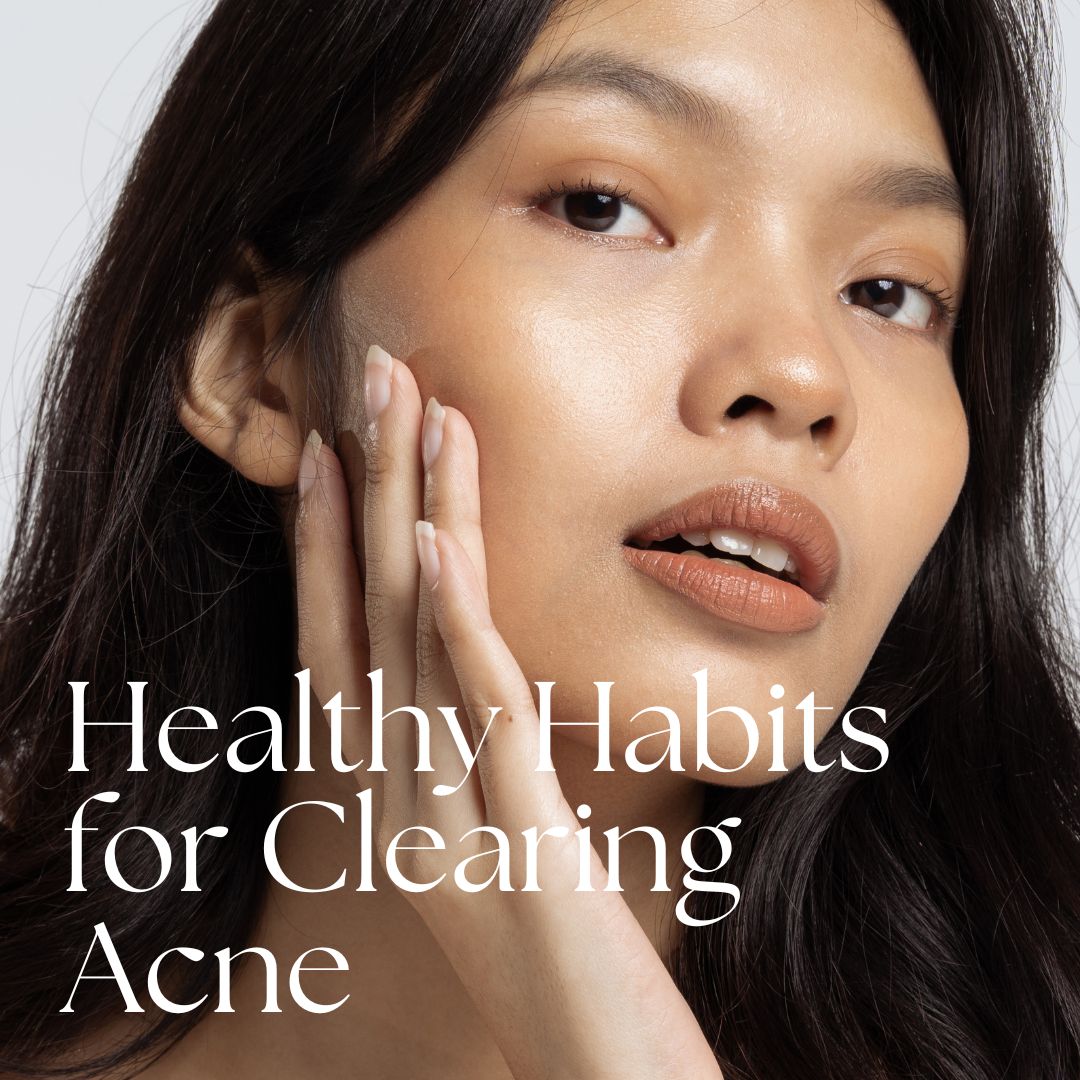
Healthy Habits for Clearing Acne and Achieving Blemish-Free Skin
Share
Healthy Habits for Clearing Acne and Achieving Blemish-Free Skin
Acne is a common skin condition that affects millions of people worldwide. It can cause not only physical discomfort but also have a significant impact on one's self-esteem. While there are numerous topical treatments and medications available, incorporating healthy habits into your daily routine can play a crucial role in clearing acne and achieving blemish-free skin. In this blog, we will explore a variety of lifestyle habits that can help you achieve and maintain healthy, glowing skin.
Maintain a Balanced Diet:
Your diet plays a vital role in maintaining overall skin health. Opt for a well-balanced diet rich in fruits, vegetables, whole grains, lean proteins, and healthy fats. Avoid excessive consumption of processed foods, sugary snacks, and greasy fast food, as they can contribute to inflammation and exacerbate acne. Additionally, stay hydrated by drinking plenty of water throughout the day, as it helps flush out toxins and keeps your skin hydrated from within.
Cleanse Your Skin Regularly:
Keeping your skin clean is essential for preventing clogged pores and acne breakouts. Use a gentle cleanser suitable for your skin type to remove dirt, excess oil, and makeup residue. It's important not to over-cleanse or use harsh products, as this can strip your skin of its natural oils and disrupt its balance. Cleanse your face twice a day, morning and evening, and consider using non-comedogenic products to minimize the risk of pore blockage.
Practice Gentle Exfoliation:
Regular exfoliation helps remove dead skin cells, unclog pores, and promote skin cell turnover. However, it's crucial to choose gentle exfoliants to avoid irritating the skin. Physical exfoliants like scrubs can be effective but should be used with caution, as they can be harsh on sensitive or inflamed skin. Chemical exfoliants containing ingredients like salicylic acid or glycolic acid are often milder and can be beneficial for acne-prone skin. Limit exfoliation to 1-2 times a week to avoid overdoing it.
Moisturize Adequately:
Contrary to popular belief, moisturizing is essential, even if you have oily or acne-prone skin. Using a lightweight, oil-free moisturizer helps maintain the skin's natural moisture barrier and prevents excessive dryness. Look for non-comedogenic products that won't clog your pores. Moisturizing also helps balance sebum production and reduces the likelihood of the skin compensating by producing more oil, which can lead to acne.
Protect Your Skin from the Sun:
Excessive sun exposure can lead to skin damage and worsen acne. UV rays can increase inflammation and cause post-inflammatory hyperpigmentation, making acne scars more prominent. Protect your skin by using a broad-spectrum sunscreen with an SPF of 30 or higher, even on cloudy days. Additionally, wear protective clothing, such as wide-brimmed hats and long sleeves, and seek shade during peak sun hours.
Manage Stress Levels:
Stress can have a profound impact on your skin, triggering hormonal imbalances and increasing sebum production, which can lead to breakouts. Incorporate stress-management techniques into your routine, such as regular exercise, meditation, deep breathing exercises, or engaging in hobbies that you enjoy. Prioritize self-care and ensure you get enough restful sleep, as sleep deprivation can worsen acne.
Avoid Touching Your Face:
Our hands come into contact with various surfaces throughout the day, accumulating dirt, bacteria, and oil. Touching your face frequently can transfer these impurities to your skin and increase the risk of clogged pores and breakouts. Be mindful of this habit and avoid touching your face unnecessarily. If you need to touch your face, wash your hands thoroughly beforehand.
Keep Your Hair Clean and Off Your Face:
If you have long hair or bangs, make sure to keep them clean and away from your face. Hair products and oils can transfer to your skin, clogging pores and causing acne along the hairline and forehead. Regularly wash your hair and avoid using heavy styling products that can irritate your skin. Consider tying your hair back or using hairbands to prevent it from touching your face.
Change Your Pillowcases Regularly:
Pillowcases can harbor dirt, oil, and bacteria, which can transfer to your skin as you sleep. Change your pillowcases at least once a week to prevent the buildup of these impurities. Opt for cotton or silk pillowcases, as they are gentler on the skin and absorb less oil compared to synthetic fabrics.
Avoid Picking or Popping Pimples:
As tempting as it may be, avoid picking, squeezing, or popping pimples. These actions can lead to further inflammation, scarring, and even infection. Instead, apply topical acne treatments containing ingredients like benzoyl peroxide or salicylic acid, which can help reduce inflammation and promote healing. If you're struggling with severe or persistent acne, consult a dermatologist for appropriate treatment options.
Conclusion:
Achieving blemish-free skin requires a holistic approach that includes adopting healthy habits in your daily routine. By following a balanced diet, practicing regular cleansing and exfoliation, moisturizing adequately, protecting your skin from the sun, managing stress levels, avoiding face touching, keeping your hair clean, and changing pillowcases regularly, you can significantly reduce the occurrence of acne and achieve clearer, healthier skin. Remember, consistency is key, and it may take time to see noticeable improvements. Patience, along with these healthy habits, will help you achieve the clear and blemish-free skin you desire.